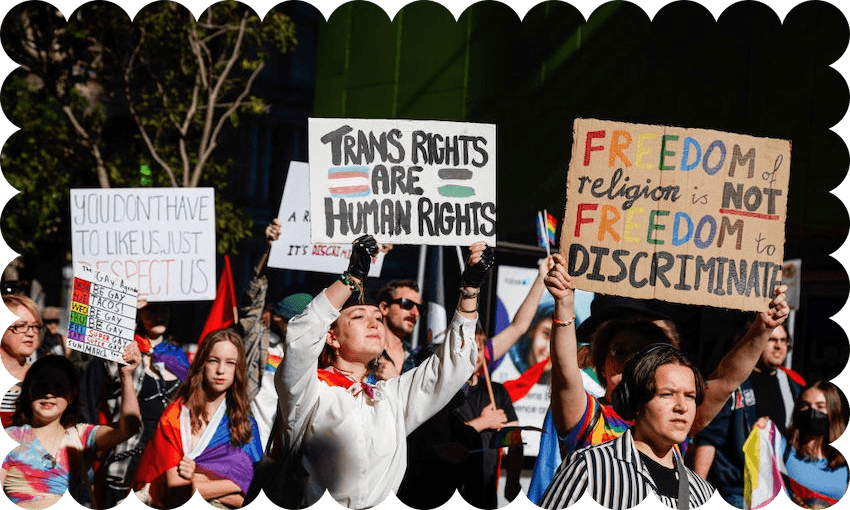Immigration NZ says it knows some people will be unhappy, but ultimately the threshold to bar Kellie-Jay Keen-Minshull from New Zealand hasn’t been reached.
The British anti-transgender campaigner Kellie-Jay Keen-Minshull, also known as Posie Parker, will be allowed into New Zealand this weekend, Immigration NZ has confirmed.
Keen-Minshull’s ability to use her visa waiver status was up in the air after aggressive protests in Melbourne over the weekend. Supporters of the speaker marched alongside neo-Nazis who were seen performing Nazi salutes and carrying messages like “Destroy paedo freaks”.
But, in a statement just released to media, Immigration NZ’s general manager Richard Owen said it had been determined that Keen-Minshull could enter New Zealand as she had planned.
“After reviewing all publicly known information about Ms Keen-Minshull and seeking advice from other agencies we have concluded that there is no reason to believe that she is, or is likely to be, a threat or risk to the public order or public interest,” said Owen.
“As a result we have determined that Ms Keen-Minshull does not meet the high threshold to be considered an excluded person under Section 16 of the Immigration Act 2009. We note there is nothing specified in the Immigration Act or immigration instructions which could be used to prevent a person travelling to New Zealand on a temporary basis based on their previous expression of opinion and ideas.”
Under section 16 of the act, a person can only have their visa waiver removed should it be deemed they are likely to commit a serious offence – or be a likely risk to security or public order.
“We appreciate that some people will not agree with this assessment,” Owen’s statement continued. “But it is critical that INZ applies the law in all such cases, regardless of the views the individual holds.”
Keen-Minshull’s planned two-stop tour of New Zealand has proven controversial since it was first announced earlier this year. The Rainbow Greens already released an open letter condemning the tour – a message later endorsed by MPs from the party and Wellington’s mayor, Tory Whanau.
The government was reluctant to openly criticise the controversial speaker. Immigration minister Michael Wood initially deferred calls about her visa to the ministry, though today told Newshub he’d prefer Keen-Minshull never set foot in the country.
“I find many of her views repugnant, and am concerned by the way in which she courts some of the most vile people and groups around including white supremacists,” Wood said.
Prime minister Chris Hipkins, too, criticised her views but wouldn’t take a side over whether or not her freedom of speech should be taken away.
“I condemn people who use their right to free speech in a way that seeks to deliberately create division. It’s not something I would attend or engage with,” he told a press conference on Monday.
Keen-Minshull, in a video released this week, threatened the prime minister over the possibility that her visa could be revoked. “Roll the dice, my friend. I don’t think you’ll dare to keep me from coming into New Zealand. But we’ll see,” she said.
The opposition have been more open with their views. National’s deputy leader Nicola Willis told RNZ that Keen-Minshull should be allowed into the country.
“This is a free and liberal democracy and part of that is that we believe in freedom of expression even when we really don’t like the views of those that are expressing themselves freely,” she said.
“We uphold that right. And I’m a big believer that sunlight is a good disinfectant. Where people have views that some of us find abhorrent, sometimes the best thing is to allow others to respond with their counter views.”
The first of Keen-Minshull’s speaking events is scheduled for this Saturday in Auckland. If it’s anything like her visit to Hobart earlier this week, supporters may struggle to hear her speech over the chants from counter-protesters.



